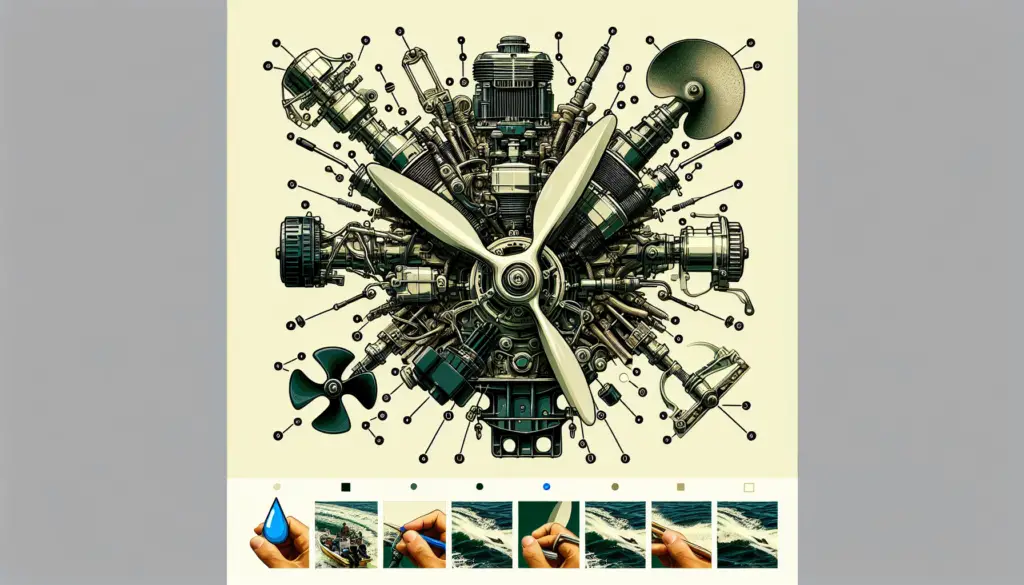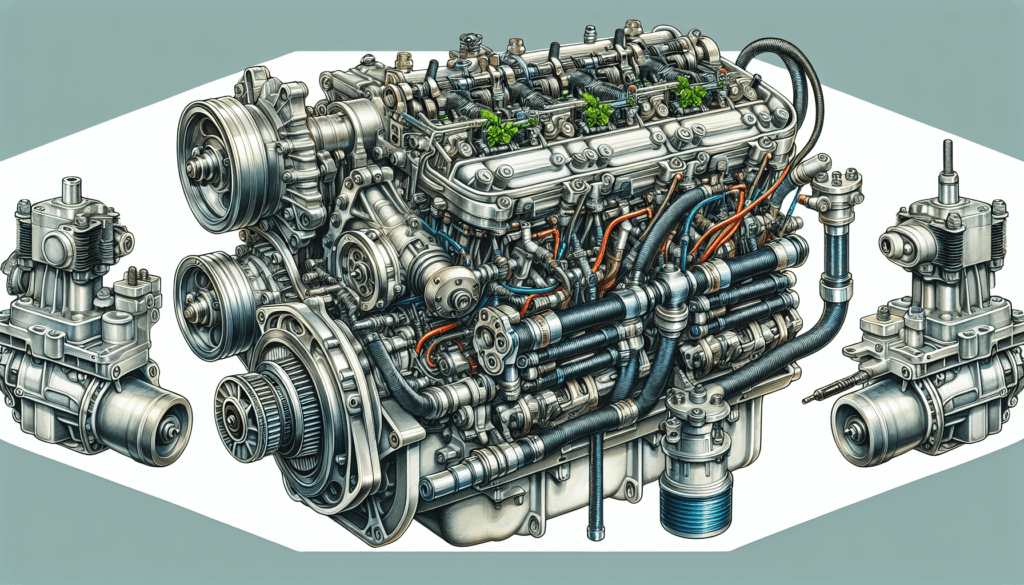As a boat owner, there’s no denying the allure of the open sea — the gentle sway, the salty breeze, the rhythmic splash of the water against the hull; but owning a boat isn’t all smooth sailing. To ensure your vessel is always ready for action, there’s a laundry list of components that demand your attention. This article, “The Top 10 Boat Engine Parts and Components You Should Regularly Inspect,” details the critical engine parts and components that require your regular and scrupulous inspection. The guide is designed to empower you to identify potential issues early, prolonging your boat engine’s lifespan and keeping your maritime adventures afloat.
Engine Oil and Oil Filter
Proper maintenance of your boat engine requires periodic inspection and potential replacement of the engine oil and oil filters.
Importance of Regular Inspection
Routine inspection of engine oil and filters is key to ensuring the longevity and efficient performance of your boat. These elements play a crucial role in preventing friction among engine parts, which might otherwise lead to excessive wear and tear. The oil filter, on the other hand, is responsible for removing impurities from the oil ensuring the oil remains clean for optimal engine performance.
Identifying Potential Issues
When checking your engine oil, signs of trouble may include a dark, dirty color indicating contamination, or a low oil level, which could be a sign of an oil leak. Similarly, oil filters can become clogged with contaminants over time and, if not replaced, can lead to a decrease in engine performance and even possible engine damage.
Maintenance Tips and Recommendations
Consistent oil and filter change is the best way to ensure your engine stays in top-notch condition. As a guideline, change the oil every 50-100 hours of operation or at least once per season. Similarly, the oil filter should be replaced every time the oil is changed.
Spark Plugs
The spark plugs are another essential element to consider in your boat’s engine maintenance.
Purpose of Spark Plugs in Boat Engines
The sparkle plug ignites the fuel-air mixture in the engine, creating a spark that powers your boat. Without functioning spark plugs, your boat engine may not run smoothly, or worse, may not run at all.
Common Spark Plug Problems
Issue with spark plugs typically include wear, deposits, and fouling. Worn or fouled spark plugs can result in a rough engine idle, poor fuel economy, engine misfires, and difficulty starting the boat.
Proper Care and Maintenance
Keeping an extra set of spark plugs on board is a smart move in case of failure. It’s recommended to inspect and clean them regularly and replace them every 100 hours of operation or once every season.

Fuel System
A well-maintained fuel system is vital for your boat’s overall performance.
Significance of a Healthy Fuel System
The fuel system carries fuel from the tank to the engine. A fully functional fuel system ensures efficient fuel consumption, thereby optimizing your boat’s performance and mileage.
Detecting Fuel System Issues
Common signs of fuel system issues include difficulty starting the engine, lackadaisical performance, and abnormal fuel consumption. These could often be traced to blockages in the fuel lines or problems with the fuel pump.
Correct Cleaning and Maintenance
Preventing ethanol-based fuel problems by using appropriate fuel additives can protect against the adverse effects of ethanol in boat engines. Regular inspection of the fuel lines for leaks or damages is also essential.
Propellor
Your boat’s propeller is one of the most vital components in its operating system.
The Role of the Propellor
The propellor’s role is to provide forward motion for your boat by propelling water behind it, allowing your boat to move forward.
Recognizing Warning Signs of Damage
If the propellor is damaged, it can result in reduced speed and wasted fuel. Signs of an issue may include visible damage like dents or chips or increased engine RPM without a corresponding speed increase.
Maintenance Practices for Optimal Performance
It’s important to inspect the propeller regularly for debris entanglement or any visible signs of wear or damage. Depending on the level of damage, it may need repair or replacement.

Belt and Hoses
Belts and hoses play crucial roles in the functioning of your boat’s engine.
Function of Belts and Hoses in Boat Engine
Belts and hoses control everything from the alternator to the water pump in your engine. They circulate coolant, deliver fuel, and keep essential engine parts moving in harmony.
Potential Belt and Hose Problems
Signs of potential problems include leaks from the cooling system (which could indicate a broken hose), battery charging issues (linked to the alternator belt), or high-temperature readings (which could point towards a damaged water pump belt).
Tips for Regular Inspection and Maintenance
Regularly inspect your belts and hoses for signs of wear, such as cracks, glazing, or material loss, and replace them as needed. As a rule, hoses should be replaced every five years and drive belts every 100 hours of operation.
Cooling System
A fully functional cooling system is essential for your boat’s engine to run smoothly.
Understanding the Cooling System
The cooling system circulates coolant to keep your engine at the optimal operating temperature.
Common Issues with the Cooling System
If the cooling system is not functioning correctly, it can lead to overheating and engine wear or damage. Indicators of cooling system problems can include high-temperature readings, leaky coolant, or a clogged radiator.
Inspection and Maintenance Suggestions
Regularly inspect your coolant level, and check for leaks or signs of a clogged cooling system, such as corroded parts or mineral deposits. Also, change your coolant per the manufacturer’s recommendations.

Alternator
The alternator is an important yet often overlooked component of the boat’s engine.
Importance of the Alternator
The alternator is responsible for supplying the electrical needs of your boat while recharging its battery.
Recognizing Potential Alternator Problems
Indicators of a faulty alternator can include a weak or dead battery, dimmed dashboard lights, or a growling or whining noise from the engine.
Effective Alternator Maintenance
The key to maintaining your alternator is to check it regularly, looking for signs of wear such as cracked or frayed belts. A multimeter can also be used to verify it is producing the correct voltage.
Battery
The battery is the heartbeat of your boat and thus should be properly cared for.
The Necessity of a Reliable Battery
Having a reliable battery is vital as it provides the power your boat’s engine needs to start and run, in addition to powering all the electronics aboard.
Identifying Battery Problems
Signs of battery issues may include difficulty starting the engine, dim or flickering lights, or the need to often charge the battery.
Appropriate Battery Care and Maintenance
Keep the battery terminals clean and ensure it is always fully charged. Replace the battery if it’s more than three years old, or if it fails to hold a charge.

Drives and Transmissions
A well-maintained drive and transmission system assure your boat operates efficiently and smoothly.
Role of Drives and Transmissions in Boat Performance
Drives and transmissions are essential in controlling your boat’s speed and direction.
Common Drives and Transmission Issues
Issues here can result in reduced fuel efficiency, strange noises, or difficulty shifting gears.
Recommended Inspection and Maintenance Measures
Regularly check the fluid levels and watch for leaks. The drive belts should also be inspected for wear or signs of stretch, and replaced if necessary.
Exhaust System
Maintaining your exhaust system is crucial for ensuring the safety and functionality of your boat.
Understanding the Boat’s Exhaust System
The exhaust system funnels waste gases away from the boat. An efficient system ensures your boat’s safety and improved boat performance.
Typical Exhaust System Problems
Common problems can manifest as excessive smoke, an odd smell, or a decrease in your boat’s overall performance.
Regular Maintenance of Exhaust System
Regularly check your exhaust system for signs of damage or blockage, and have it repaired by a professional if necessary. Regular inspection is the best way to keep your boat’s exhaust system running smoothly.

